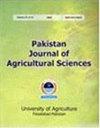α-酮戊二酸对肉鸡生长、免疫及肠道微生物群影响的初步研究
IF 0.6
4区 农林科学
Q3 AGRICULTURE, MULTIDISCIPLINARY
引用次数: 0
摘要
α -酮戊二酸(AKG)是谷氨酸的前体,是三羧酸循环的关键中间体,近年来,对AKG的研究显著增加。几项研究表明对肠道功能有积极作用。肉鸡的肠道免疫和微生物群尚未研究与早期AKG补充的关系,并且仍有许多未解决的问题。在肉鸡模型中,本研究考察了添加AKG对肉鸡生长性能、肠道免疫和肠道微生物群的影响。288日龄肉鸡随机分为4组(6个重复,每个重复12只鸡)。NC(基础饲粮)、PC(基础饲粮加15ppm维吉尼亚霉素)、低AKG和高AKG(基础饲粮加α -酮戊二酸盐分别为1kg/t和2kg/t)。本研究结果显示,在第21天,饲粮中添加AKG比不添加AKG更能提高ADFI。高AKG组和低AKG组在第21天和第42天的FCR分别高于对照组。低AKG组全净膛率均较高,但高、低AKG组大腿肌率均较低。高AKG组胸腺重量低于正常对照组,而高AKG组脾脏重量高于正常对照组。α-KG对免疫应答相关基因无显著影响。对所有样本进行16S rRNA测序,并用QIIME分析数据。NC组、PC组和AKG组肠道群落多样性和组成无显著差异。厚壁菌门、拟杆菌门、Campilobacterota和变形菌门在所有四组中均为优势门。优势纲为芽胞杆菌、细菌门、梭状芽胞杆菌和阴性门。乳酸菌门、拟杆菌门和毛螺门为优势目。优势科为乳酸菌科、乳酸菌科和利肯菌科。优势属为乳杆菌属。优势菌种包括拟杆菌、鸟乳杆菌和千禧年杆菌。由此可见,在肉鸡中使用AKG对胃肠道微生物多样性没有显著影响本文章由计算机程序翻译,如有差异,请以英文原文为准。
Influence of Alpha-Ketoglutarate supplementation on broiler chickens’ growth, immunity and gut microbiota: A Preliminary Study
Alpha-ketoglutarate (AKG), a precursor of glutamate and a critical intermediate in the tricarboxylic acid cycle, Over the past few years, the amount of research being done on AKG has significantly increased. Several studies have shown positive effects on the intestinal function. Broiler chickens' intestinal immunity and microbiota have yet to be studied in relation to AKG supplementation from early life, and many unanswered questions remain. In a broiler model, this study examines the effect of AKG supplementation on growth performance, intestinal immunity, and intestinal microbiota. 288-day-old broiler chickens were divided into four groups at random (6 replicates each replicate has 12 chickens). NC (basal diet), PC (basal diet plus 15ppm virginiamycin), Low AKG and High AKG (basal diet + Alpha-ketoglutarate 1kg/t and 2kg/t, respectively). The findings of our study revealed that dietary AKG supplementation increased ADFI more than NC at 21 days. While as compared to NC at 21 day and 42 day FCR was higher in high AKG and low AKG groups respectively. All eviscerated ratio was higher in low AKG group, but the thigh muscle ratio was lower in both low and high AKG groups. Thymus weight was lower in high AKG group but interestingly spleen was higher in high AKG group as compared to NC. The immune response-related GENES was not significantly modified by α-KG. 16S rRNA sequencing was performed on all samples and data was analyzed using QIIME. No significant difference in gut community diversity or composition between NC, PC and AKG groups was observed. Firmicutes, Bacteroides, Campilobacterota, and Proteobacteria were found to be dominant phyla in all four groups. The dominant class was Bacilli, Bacterioda, Clostridium, and Negativicutes. Lactobacillales, Bacteroidales, and Lachnospirales were dominant orders. The dominant family were Lactobacillae, Bacterideceae, and Rikenellacae. The dominant genus was Lactobacillus. The dominant species included Bacteroides phelibetes, Lactobacillus aviarus, and Bacteriodes sp millerius. This finding suggests that use of AKG in broilers does not significantly influence microbial gastrointestinal diversity
求助全文
通过发布文献求助,成功后即可免费获取论文全文。
去求助
来源期刊

Pakistan Journal of Agricultural Sciences
AGRICULTURE, MULTIDISCIPLINARY-
CiteScore
1.80
自引率
25.00%
发文量
18
审稿时长
6-12 weeks
期刊介绍:
Pakistan Journal of Agricultural Sciences is published in English four times a year. The journal publishes original articles on all aspects of agriculture and allied fields.
 求助内容:
求助内容: 应助结果提醒方式:
应助结果提醒方式:


